Politics
Erdoğan files TL 1 million suit against CHP leader Özel
President Recep Tayyip Erdoğan has filed a TL 1 million ($30,000) compensation lawsuit against Republican People’s Party (CHP) Chair Özgür Özel over remarks made during a rally and a subsequent press statement, accusing the opposition leader of making baseless and insulting allegations.
The lawsuit, announced Thursday by Erdoğan’s lawyer Hüseyin Aydın, concerns comments Özel made on Aug. 13 during a rally in Istanbul’s Bayrampaşa district and later outside Marmara Prison following a visit to suspended Istanbul Metropolitan Municipality Mayor Ekrem Imamoğlu and other detainees.
“Due to the inappropriate expressions and unfounded accusations targeting our president, a total of TL 1 million in nonpecuniary damages has been filed at the Ankara Civil Court of First Instance. In addition, a criminal complaint has been lodged with the Ankara Chief Public Prosecutor’s Office for the crime of insulting the president,” Aydın said in a statement.
The case comes shortly after the Ankara Chief Public Prosecutor’s Office launched a separate investigation into Özel over the same remarks. Speaking to reporters after his prison visit, Özel rejected rumors that Aydın Metropolitan Municipality Mayor Özlem Çerçioğlu was considering joining the ruling Justice and Development Party (AK Party). Instead, he accused political consultant Aziz Ihsan Aktaş of working with several municipalities and claimed CHP mayors were under pressure to defect to the AK Party or face prosecution.
Meanwhile, Çerçioğlu resigned from the CHP, citing disagreements with the party administration on Thursday following Özel’s remarks, and joined the AK Party. “Despite repeatedly seeking solutions to the problems we face within the CHP, we have unfortunately been unable to reach a resolution. I am no longer on the same path as the CHP,” she said in a post on X.
Later in the day, she joined the AK Party in a ceremony attended by Erdoğan along with three of her district mayors, who had also quit the CHP.
Özel’s comments quickly drew strong reactions from senior government figures, who accused the opposition leader of crossing the line of political discourse.
AK Party spokesperson Ömer Çelik condemned the statements as “disrespectful” toward the president, calling them “political aggression and lies.” “What Özel is doing is not politics – he has become a source of political poison,” Çelik said on social media, vowing to respond “with all our political strength.”
AK Party Deputy Chair Efkan Ala similarly criticized the remarks as “excessive, inappropriate and ugly,” while Presidential Communications Director Burhanettin Duran said politics should be conducted “with decorum and style.” Duran accused Özel of “airing internal political contradictions” in a manner “unacceptable in terms of political courtesy and ethics.”
Justice Minister Yılmaz Tunç also weighed in, describing Özel’s comments as “an overt attack on the national will” that had “gone beyond a matter of style” into a violation of political norms. “Our nation will never allow politics based on slander and defamation, just as it has not until now,” he said.
Under Turkish law, insulting the president is a criminal offense punishable by prison if convicted. While critics, including the CHP, argue that the statute limits freedom of expression, the government maintains it is necessary to protect the dignity of the presidency as an institution.
Erdoğan has previously brought defamation and insult cases against political figures and public personalities he accused of making false or derogatory statements. The president’s legal team has argued that such actions are vital to upholding the standards of political debate and preventing the spread of misinformation.
The CHP, Türkiye’s main opposition party, has long criticized the law on insulting the president, claiming it is often used to stifle dissent. However, government officials insist that criticism and insult are not the same, stressing that political debate must remain within the bounds of respect and factual accuracy.
The lawsuit marks a new flashpoint in already tense relations between the ruling party and the opposition, with political rhetoric intensifying on both sides. As the legal process unfolds, it is likely to further fuel debate over the limits of political speech and the balance between free expression and protecting public officeholders from defamation.
Politics
‘Terror-free Türkiye aims to build shared future with entire society’
We want to build a common future through the terror-free Türkiye process and open a new chapter in the country’s history, President Recep Tayyip Erdoğan said on Thursday, celebrating the 24th anniversary of the ruling Justice and Development Party (AK Party).
“Through the process, we will not only solve the problem of terrorism, but also aim to eradicate the possibility and threat of terrorism,” Erdoğan said at the anniversary program in the capital Ankara.
“Türkiye has caught a historical opportunity to solve its most chronic problem – we will not allow it to come to nothing.”
Calling on other political parties to support the initiative, Erdoğan said: “We do not have to think in the same manner on every issue; however, we are obliged to realize a terror-free Türkiye.”
Speaking on the terror-free Türkiye commission, which has been recently created to follow the process after the PKK laid down arms, Erdoğan said that parties should not adopt a maximalist approach here. “Whoever does this for the sake of political interests, I say it openly: Neither this nation nor future generations will forgive him.”
Let us bring down the wall that has been built between our people, let us build our future together, Erdoğan added.
“We are managing a very delicate process here. We carry the legacy of 86 million people, including Turks, Kurds and Arabs, and we strive not to stain that legacy even by the slightest blemish.”
“As the AK Party, with full dignity and awareness of the heavy burden on our shoulders, we will diligently manage this process, which will open the door to a bright future, in a manner that aligns with our nation’s expectations and the greatness of our party,” the president continued.
Underlining the party left its mark on the last quarter century, Erdoğan said: “The AK Party is stronger today, it will be even stronger tomorrow. Nothing will be like before.”
The president gave the most recent data on investments and services in several areas to the people throughout 24 years.
“We increased our exports, which were $36 billion in 2002, to $270 billion on an annual basis in July.”
He also said that the AK Party is more than a party, with the highest number of members.
“We continue to expand participation in the AK Party on its 24th anniversary with new members,” Erdoğan said, criticizing the main opposition for attacking the new members’ choice of joining the ruling party.
“We have never bowed to the tyranny of those who orchestrate reputation assassinations through their media and social media hitmen, and we will never do so again. The gentleman (CHP Chair Özgür Özel) is uncomfortable, so be it; we will make him uncomfortable even more,” Erdoğan said. “The CHP chairman is no longer a matter of politics, but is rapidly becoming a matter of psychiatry.”
Entering political life as Türkiye’s 39th party, the AK Party was introduced by Erdoğan, then the former mayor of Istanbul, with the words: “From today onwards, nothing will be the same in Türkiye.” Two days after its foundation, at the Aug. 16 Founders’ Council meeting, Erdoğan was unanimously elected chairperson, beginning a political journey that has produced four prime ministers, two presidents and multiple landmark reforms.
Just 15 months later, the party contested its first general election on Nov. 3, 2002, without its leader, who was under a political ban, and campaigned under the slogan “On our own, into power.” It won 34.28% of the vote, emerging as the leading party and forming the 58th government under Abdullah Gül.
With amendments to Article 312 of the Turkish Penal Code lifting his political ban, Erdoğan entered Parliament on March 8, 2003, in the Siirt by-election. Following Gül’s resignation, then-President Ahmet Necdet Sezer tasked Erdoğan with forming the 59th government, and on March 15, 2003, he assumed the post of prime minister.
In its first local elections in 2004, the AK Party won 41.7% of the vote, securing 1,950 municipalities, including 11 metropolitan cities. In the 2007 general elections, it increased its vote share to 46.58%, maintaining its single-party government, and again topped the 2009 local polls.
A major challenge came in 2008 when the chief prosecutor filed a closure case against the party, seeking to ban 71 members, including President Abdullah Gül and Prime Minister Erdoğan. The Constitutional Court accepted the indictment on March 31, 2008, but on July 30, it voted against closure as the required qualified majority was not met.
The 2010 constitutional referendum, held on the 30th anniversary of the 1980 coup, saw 57.88% vote “yes” to amending the 1982 Constitution. In 2011, the AK Party won the general elections with 49.53%, and in the 2014 local elections, secured 45.60%, winning 818 mayoralties, 18 of which were metropolitan municipalities.
On Aug. 10, 2014, Erdoğan was elected Türkiye’s 12th president with 52% of the vote, becoming the first to be chosen directly by the people. Konya Deputy Ahmet Davutoğlu took over as party chairperson, leading the AK Party through the June 7, 2015, general elections and the Nov. 1 snap polls, where it regained its parliamentary majority.
On May 22, 2016, Binali Yıldırım was elected chairperson at the 2nd Extraordinary Congress, forming the 65th government. That same year, on July 15, the Gülenist Terror Group (FETÖ) attempted a coup – the deadliest in Türkiye’s history. Erdoğan’s call for citizens to take to the streets and airports stopped the attempt, and the solidarity between the AK Party and the Nationalist Movement Party (MHP) paved the way for the People’s Alliance.
The April 16, 2017, constitutional referendum – initiated by an AK Party proposal signed by 316 deputies – passed with 51.41% of the vote, ushering in the presidential system and allowing the president to retain party membership. On May 2, 2017, after 979 days away, Erdoğan rejoined the AK Party and was reelected chair on May 21 with all valid votes.
The first elections under the new system were held on June 24, 2018, after a proposal for early elections by MHP leader Devlet Bahçeli was accepted. Erdoğan was reelected president with 52.38%, and the AK Party took 42.28% in the parliamentary vote, winning its 13th consecutive national election.
At the Aug. 18, 2018, 6th Ordinary Congress, Erdoğan was reelected with all valid votes. The party formalized electoral alliances in its bylaws and barred members from holding both Central Executive Board and Cabinet positions. The AK Party and the MHP continued their alliance in the local elections, with the AK Party winning 44.33% and remaining the leading party.
The 7th Ordinary Congress process, launched under the theme “Walk the road you believe in,” was interrupted by the COVID-19 pandemic but resumed in 2021. On March 24, Erdoğan was reelected chairperson with all 1,428 valid votes.
For the 2023 elections, Erdoğan moved the date from June 18 to May 14. In the first round, he won 49.52%, leading to a May 28 runoff, where he prevailed with 52.18%. The AK Party won 35.62% of the parliamentary vote, securing 268 seats and extending its record as the longest-ruling party since 1946.
On Oct. 7, 2023, the 4th Extraordinary Congress reelected Erdoğan chair with all 1,399 valid votes. The new Central Decision and Executive Board saw 49 new members, while 14 of 18 Executive Board members retained their seats.
In the March 31, 2024, local elections, the AK Party won 35.49% of the vote, capturing 24 provincial and 357 district municipalities. Erdoğan said the party would “carefully weigh the messages from the ballot box with reason and conscience” and initiated cadre changes in multiple provinces.
At the Feb. 23, 2025, 8th Ordinary Congress, 39 new members joined the 75-seat Central Decision and Executive Board, renewing more than half the body. Three new presidencies – for relations with Turkic states, health policies, and culture and arts – were established.
From its foundation to its 24th anniversary, the AK Party has been defined by uninterrupted electoral success, constitutional changes and leadership continuity under Erdoğan.
Politics
Erdoğan urges world to stop ‘humanitarian collapse’ in Gaza
In an opinion piece for Al-Jazeera, President Recep Tayyip Erdoğan urged the world to stop the war in Gaza, warning the territory is nearing a “total humanitarian collapse” under Israeli attacks.
Communications Director Burhanettin Duran announced the article’s publication on the Turkish social media platform Next Sosyal.
In the article, titled “The conscience of humanity is being tested in Gaza” and published Thursday in English and Arabic, Erdoğan accused Israel of carrying out “a systematic policy of annihilation” against Palestinians.
“Hunger, thirst and the threat of epidemic disease are propelling Gaza toward a total humanitarian collapse,” Erdoğan wrote. “To date, more than 61,000 Palestinians, the majority of them women and children, have been killed in Israeli attacks.”
Erdoğan said Türkiye has delivered food, medicine and medical supplies to Gaza despite obstacles, with assistance from “brotherly nations” nearby, and has evacuated wounded Palestinians for treatment in Türkiye.
He said Ankara continues to push for a cease-fire at the United Nations and the Organisation of Islamic Cooperation (OIC) while mediating between Palestinian groups.
Politics
Türkiye slams Israel’s W. Bank plan as threat to peace, 2-state solution
Türkiye on Thursday condemned Israel’s approval of a settlement construction plan in the E1 area of the occupied West Bank, warning that the move would sever East Jerusalem from the rest of the territory and deal a serious blow to the two-state solution and hopes for lasting peace.
In a strongly worded statement, the Foreign Ministry said the project — which will physically separate the West Bank from East Jerusalem — flagrantly violates international law and United Nations resolutions, while targeting the territorial integrity of the State of Palestine.
“Approval of this plan disregards the two-state solution and undermines prospects for a just and lasting peace in the region,” the ministry said, adding that establishing an independent and sovereign State of Palestine within the 1967 borders, with East Jerusalem as its capital and full territorial continuity, remains the only way to achieve peace.
The ministry stressed that Türkiye will continue to support “the just cause and steadfast struggle of the Palestinian people” in the face of Israel’s illegal settlement expansion and ongoing occupation.
The E1 area, a stretch of land east of Jerusalem, has long been viewed by Palestinian officials and rights groups as a critical link between the northern and southern parts of the West Bank. Settlement construction there is widely seen as a “red line” that would make a viable, contiguous Palestinian state impossible.
International observers have repeatedly warned that such expansion plans not only breach Israel’s obligations under international law but also inflame tensions and further entrench its occupation of Palestinian lands.
Spokesperson of the ruling Justice and Development Party (AK Party) Ömer Çelik, similarly condemned Israel’s move saying that the settlement plan is “an extension of their damned genocide acts.”
“At a time when the humanitarian front is making successive decisions to recognize the state of Palestine, Israel is once again attacking the humanitarian front and targeting the territorial integrity of the state of Palestine,” he wrote on social media on Friday.
Çelik underlined that Türkiye would continue its struggle for the foundation of a Palestinian state according to the 1967 borders.
Parliament Speaker Numan Kurtulmuş on Friday also reacted to Israel and said Türkiye rejects this “illegal” decision.
“The treacherous plan by occupying Israel to divide the West Bank from East Jerusalem is a blatant attack that ignores international law and United Nations resolutions, undermines the territorial integrity of Palestine, and is part of a genocidal scheme,” he said, according to a statement by Parliament.
Israel’s settlement expansion and land seizure in the West Bank have intensified significantly. According to Peace Now, an Israeli NGO, land appropriations in the first quarter of 2025 have already exceeded the total for all of 2024.
Currently, over 451,000 Israeli settlers reside in the West Bank and another 230,000 in East Jerusalem, settlements considered illegal under international law. These settlers live under Israeli civil law, while approximately 4 million Palestinians in the West Bank remain under Israeli military rule.
Palestinians face harsh daily conditions, including road closures, frequent military raids and violent attacks from settlers. Human rights groups have repeatedly warned that these conditions amount to systematic discrimination and collective punishment.
Israel is already facing a genocide case at the International Court of Justice (ICJ) over its military actions in Gaza since Oct. 7, 2023.
Türkiye has been vocal in calling out what it describes as Israel’s genocidal policies and the failure of the international community to enforce legal standards.
With the annexation vote, critics warn that Israel is moving toward de jure annexation of Palestinian land, solidifying control in ways that would further derail prospects for a two-state solution.
Türkiye’s statement concluded with a call for immediate international accountability, warning that inaction could lead to deeper instability and irreparable damage to the peace process in the region.
Politics
Beyoğlu district mayor arrested in corruption probe
Police on Friday detained 44 people, including the mayor of Istanbul’s central Beyoğlu district, Inan Günay, as part of a corruption investigation.
The Beyoğlu district is held by the main opposition Republican People’s Party (CHP). Municipalities controlled by the CHP have faced waves of arrests this year, beginning in March.
Güney was the 16th mayor to have been taken into custody in the crackdown, in which a total of more than 500 people have been detained in less than a year.
The Istanbul Chief Public Prosecutor’s Office is conducting an investigation into the suspects, including Ekrem Imamoğlu, who was suspended from his position as Istanbul Metropolitan Municipality mayor after his arrest, on charges of “leading a criminal organization,” “membership in a criminal organization,” “extortion,” “bribery,” “aggravated fraud,” “unlawful acquisition of personal data” and “tender rigging.”
The Istanbul police office’s teams from the Financial Crimes Department determined that those held in the latest operation are suspected of involvement in fraudulent activities at companies linked to the Istanbul municipality.
The CHP denies the charges and calls them an attempt to eliminate a democratic alternative, a charge the government rejects.
Politics
Türkiye, Armenia eye historic opening after Azerbaijan peace deal
The signing of a permanent peace agreement between Armenia and Azerbaijan has set the stage for a potential historic breakthrough in Türkiye–Armenia relations, raising hopes for open borders, renewed diplomacy and deeper regional connectivity in the South Caucasus.
Hazel Çağan Elbir, analyst at the Ankara-based Center for Eurasian Studies (AVIM), said the deal, signed at the White House by Armenian Prime Minister Nikol Pashinyan, Azerbaijani President Ilham Aliyev and U.S. President Donald Trump, is a “critical development” that strengthens Türkiye’s regional standing and opens new avenues for cooperation.
“The Azerbaijan-Armenia peace agreement is a critical development in terms of facilitating lasting peace in the South Caucasus and offering significant opportunities that can bolster Türkiye’s regional status,” Elbir told Daily Sabah.
The treaty commits Armenia and Azerbaijan to end hostilities, respect each other’s sovereignty, open trade and travel, and dismantle the OSCE Minsk Group that for decades mediated their conflict over Karabakh.
Baku and Yerevan have been at odds since the late 1980s, when Nagorno-Karabakh, a mountainous Azerbaijani region, was occupied by Armenia-backed armed separatists. Azerbaijan took back full control of the region in 2023, and some 100,000 Armenians in the enclave returned to Armenia. Peace negotiations had been underway for nearly two years, with no sign of progress, until the White House stepped in.
A centerpiece in the accord is the Trump Route for International Peace and Prosperity (TRIPP), a multimodal corridor through southern Armenia linking mainland Azerbaijan with its Nakhchivan exclave, and, by extension, Türkiye.
Elbir said the corridor could “turn Türkiye into a strategic hub in trade and transport routes connecting Central Asia and China.”
With projects such as the Trans-Anatolian Natural Gas Pipeline (TANAP) and the Baku-Tbilisi-Kars railway already in place, she said, “This corridor will also enhance Türkiye’s importance in energy security and economic connectivity.”
With its geographical position, existing infrastructure and experience in regional projects, Türkiye has a rather convenient status to seize these opportunities, Elbir added.
However, she warned that the realization of this potential depends on Armenia’s commitment to the peace agreement and openness to cooperation in regional projects.
Opening a long-shut gate
The peace deal has revived hopes of reopening the Türkiye-Armenia border, closed since 1993 after Armenian forces seized territory in and around Karabakh.
Elbir said the Azerbaijan-Armenia peace agreement offers a significant opportunity to expedite the normalization process between Türkiye and Armenia, which reset in 2021 with little progress since.
The two countries share a complex history. Armenia, for a long time, has accused Türkiye, or rather, the Ottoman Empire, of committing genocide against the Armenian population in the country during World War I. Türkiye has repeatedly denied the claims of genocide, although it has acknowledged a high number of deaths among Armenians due to isolated incidents and diseases.
“Türkiye has taken well-intentioned rapprochement steps in the past through initiatives such as the 2009 Zurich Protocols, but Armenian domestic political dynamics and diaspora pressures negated these efforts,” Elbir argued.
The 2009 Zurich Protocols were a pair of agreements signed in Switzerland by Türkiye and Armenia to restore diplomatic ties and reopen their border.
The pacts also called for a joint historical commission to study the events of World War I and promoted bilateral trade and transport links, but they were never ratified.
Türkiye linked approval to resolving Armenia’s conflict with Azerbaijan, while Armenia’s Constitutional Court added terms that Ankara said undercut the deal. Withdrawn in 2015 and voided in 2018, they remain one of the few serious but failed attempts at reconciliation.
According to Elbir, the peace agreement could push Armenia to a “more pragmatic foreign policy.”
She said that the opening of the Zangezur Corridor “will not only strengthen the Türkiye-Azerbaijan connection but also provide economic benefits by facilitating Armenia’s integration into regional trade. And this could incentivize Yerevan to improve its relations with Ankara.”
“In response to Türkiye’s goodwill, Armenia is expected to take steps such as taking on a constructive role in projects like the Zangezur Corridor; adhering to the border security commitments,” she said.
She believes Yerevan should especially focus on a peace-oriented vision based on international law against the “practically challenging” demands of diaspora groups like the Armenian National Committee of America (ANCA), such as returns to Karabakh.
“It should also abandon its rhetoric about Türkiye regarding World War I events and take concrete economic and diplomatic cooperation,” she added.
Armenia is notable for having a large diaspora population with influence outside the landlocked Caucasian country. The diaspora is notorious for rejecting overtures for peace from Türkiye and Azerbaijan and opposing Azerbaijani control of Karabakh while guaranteeing the safety of Azerbaijani civilians living there.
Balancing with Iran
Meanwhile, the proposed TRIPP project has incensed Türkiye’s eastern neighbor, Iran, which also borders Armenia from the south, where the corridor would cross. Citing concerns over exclusive U.S. involvement, Iran has threatened to block the plan.
“Iran has historically been wary of transit projects in the South Caucasus, considering them as threats to its own geopolitical interests,” Elbir said.
“Projects like the Zangezur Corridor and the TRIPP stoke Iranian concerns that Iran will be sidelined in regional trade routes,” she said, arguing that Tehran also foresees these projects will increase Azerbaijan and Türkiye’s regional influence and weaken Iranian influence on Armenia.
“Türkiye at this point could take an inclusive rather than exclusive approach toward Iran to navigate any potential pushback from Tehran,” Elbir said.
She suggested Ankara can ease Iran’s concerns of isolation by developing a balanced cooperation with Russia and China, which would soften Iran’s opposition.
“Türkiye can navigate this process with a decisive yet reconciliatory diplomacy by considering Iran’s sensitivities. Stressing that regional projects will provide economic opportunities for all actors could reduce Iran’s resistance and bolster the success of the peace process,” Elbir said.
Politics
Erdoğan discusses Russia-Ukraine war with NATO chief Rutte
President Recep Tayyip Erdoğan discussed the ongoing Russia-Ukraine war in a phone call with NATO Secretary-General Mark Rutte, held at Rutte’s request.
The two leaders exchanged views on the latest developments in the war, as well as regional and global issues. Erdoğan underlined the progress made in the Istanbul negotiations aimed at securing a lasting cease-fire between Moscow and Kyiv, stressing that Türkiye considers it important for this process to also enable positive steps on humanitarian matters.
Rutte shared assessments on the situation in Ukraine ahead of the upcoming Alaska Summit between U.S. President Donald Trump and Russian President Vladimir Putin. Erdoğan said Türkiye is closely following the planned meeting in Alaska.
The rival sides met earlier in Istanbul on May 16 and June 2 amid U.S. pressure to agree on a cease-fire to end the three-year-old conflict. Despite the urging of U.S. President Donald Trump, no major breakthrough was made.
Ankara is keen on boosting its international profile as a key mediator and utilizes Istanbul’s symbolic location to promote diplomacy between the parties involved in conflicts and disagreements on a global level.
NATO member Türkiye is one of the most active countries working to ensure a permanent cease-fire between Ukraine and Russia. Its delicately balanced act of assuming a role as a mediator by keeping communication channels with both warring sides open provides a glimmer of hope in diplomatic efforts to find a solution and achieve peace in the Ukraine crisis. With its unique position of maintaining friendly relations with both Russia and Ukraine, Türkiye has garnered widespread praise for its efforts to end the war.
While Ankara has opposed international sanctions aimed at isolating Moscow, it has also closed its straits to prevent some Russian vessels from crossing through them.
-
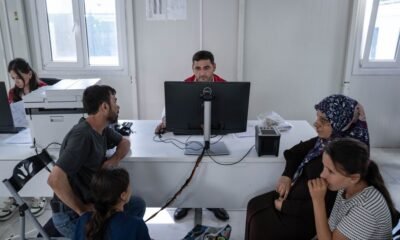
 Politics3 days ago
Politics3 days agoOver 410,000 Syrians return from Türkiye since Assad’s fall
-

 Economy3 days ago
Economy3 days agoTrump says to set tariffs on steel, semiconductors in coming weeks
-

 Lifestyle3 days ago
Lifestyle3 days agoHeat, heritage, high style: Your ultimate guide to Miami’s magic
-
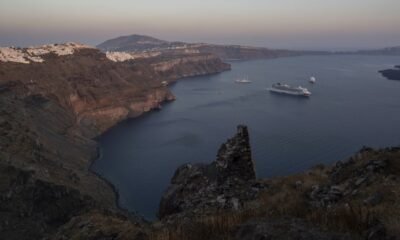
 Politics3 days ago
Politics3 days agoTürkiye asserts maritime rights with new protection zones
-
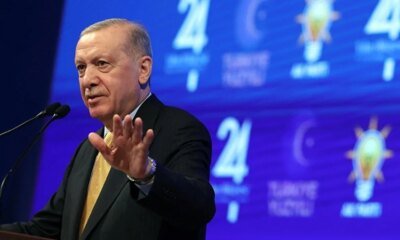
 Daily Agenda3 days ago
Daily Agenda3 days agoAnatolian Revolution 24 Years Old – Breaking News
-
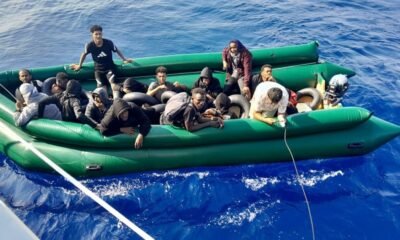
 Politics3 days ago
Politics3 days agoTurkish coast guard rescues 43 irregular migrants in Aegean
-
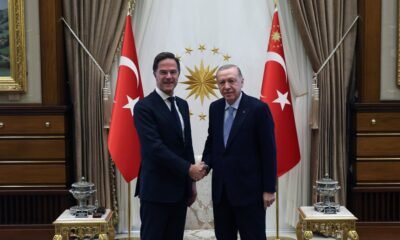
 Politics3 days ago
Politics3 days agoErdoğan discusses Russia-Ukraine war with NATO chief Rutte
-

 Daily Agenda3 days ago
Daily Agenda3 days ago90 minutes reaction from AK Party Saygılı to İZBB and questions to TUGAY!




